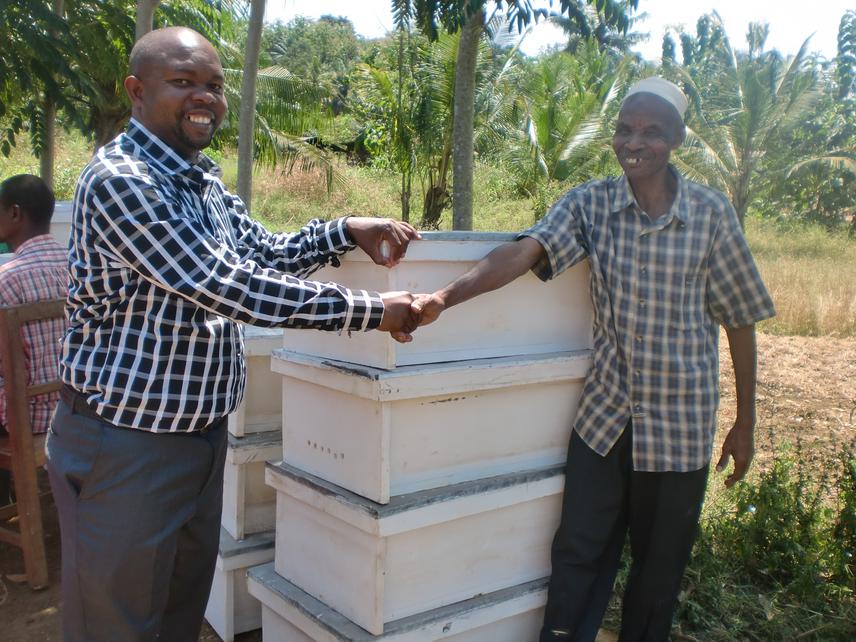Iddi Mwanyoka
Other projects
2 Jun 2014
Promoting Beekeeping as an Innovative Mechanism for Biodiversity Conservation and Community Livelihoods Improvement in the East Usambara Mountains, Tanzania
21 Feb 2017
Sustaining Modern Beekeeping as a Mechanism for Biodiversity Conservation and Community Livelihoods Improvement in the East Usambara Mountains
To scale-up modern bee-keeping as an innovative mechanism for biodiversity conservation and community livelihoods in the East Usambara Mountains, Kimbo and Shembekeza villages

The grantee handing over beehives to the Chairman of Mapatano bee keeping group.
This project is a continuation of phase one whose focus was on promoting modern bee keeping in Kimbo and Shembekeza villages located in the East Usambara Mountains. These two villages are part of 22 villages surrounding the Amani Nature Reserve which is renowned for its biodiversity richness. The population of these two villages is estimated to be 697 and 1110 people respectively.
The thrust to implement this project emanates from the fact that the East Usambara Mountains is a biodiversity “hotspots” with local and global conservation importance. Encouragingly; the existing Village Land Act of 1999 supports community-based natural resources management as it empowers the community at local level (village), to implement natural resource management and that through village land-use management system; beekeepers can be allocated land for beekeeping development.
There also exist great potential for beekeeping in the East Usambaras, a sector which is increasingly being recognized as Potential Avenue towards sustainable community livelihood improvement in Tanzania. More importantly studies indicate that the role of bees in sustaining forests and forest dependent livelihoods remains poorly known and appreciated. However, bees are a fantastic world resource: they are essential for sustaining our environment because they pollinate flowering plants. Bees sustain our agriculture by pollinating crops and thereby increasing yields of seeds and fruits (Bradbear 2009). Thus, implementation of this project is part of the efforts to generate information and demonstrate importance and the role of bee keeping in enhancing conservation and improving livelihoods. One critical observation made during phase one is the overwhelming interest of the community members to implement modern bee-keeping; but lacking basic knowledge on modern bee keeping and how one would start up a beekeeping project. During the current project phase more community members will be involved and it is anticipated that more impact in terms of forest conservation and livelihood outcomes will be realized. Of the expected conservation outputs and outcomes from the project are: the increased number of modern beekeepers in the East Usambara Mountains (project area), increased number of beehives to be constructed by the beekeeping group members and increased bees population in the East Usambara Mountains which will in turn add value to biodiversity and enhance pollination. To achieve these outputs/outcomes a number of activities will be discharged sequentially.
These activities will include but not limited to: forming additional beekeeping groups in Kimbo and Shembekeza villages, training new group members on modern bee keeping, Sitting/Hanging of the beehives and monitoring the implementation of the project implementation. To successfully implement project activities; different stakeholders will be involved including farmers in Kimbo and Shembekeza villages, the Muheza Forestry and Beekeeping unit and village governments in the project area. For sustainability purposes, efforts will also be made to link the project with other stakeholders from within and outside Tanzania.